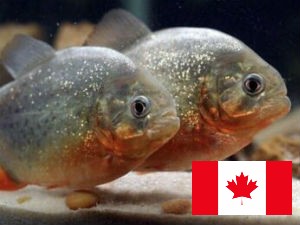
Are Piranhas Legal in Canada Today? The Legality of Piranhas in Canada
 The infamous piranha conjures images of dangerous waters filled with ravenous fish, leading many to question whether these notorious creatures can legally be kept as pets in Canada. Policies governing private piranha ownership vary across the country depending on federal, provincial, and municipal regulations in place.
The infamous piranha conjures images of dangerous waters filled with ravenous fish, leading many to question whether these notorious creatures can legally be kept as pets in Canada. Policies governing private piranha ownership vary across the country depending on federal, provincial, and municipal regulations in place.Some provinces permit possession under certain conditions, while other regions enforce outright bans with no exceptions in the name of public safety. Local bylaws can also prohibit piranha ownership within city limits, creating an added layer of legal complexity. Responsible piranha enthusiasts must untangle the web of laws at multiple levels of government to discern where possession is forbidden versus simply regulated. Let's examine the nuances across Canada in policies regarding piranha ownership and importation to understand the legal landscape these predatory fish face.
Piranhas captivate aquarists with their infamy, but are these notorious fish legal to keep in Canada? Regulations on piranha ownership vary somewhat by province.
Federal Regulations
Piranhas are not prohibited under Canada's federal Fisheries Act which governs importation of fish. Thus, they may be brought into the country if properly declared and inspected. However, it is important to note that some provinces and territories in Canada have their own regulations on the possession of piranhas. For example, in British Columbia, it is illegal to possess piranhas unless you have a special permit.
If you are planning to bring piranhas into Canada, it is important to check with the relevant provincial or territorial authorities to ensure that you are in compliance with all applicable regulations.
Provincial Laws
Some provinces like Alberta, British Columbia, and Saskatchewan, allow piranha possession with no special restrictions. Others like Manitoba prohibit ownership completely. Ontario allows ownership but under a controlled license.
Municipal Bans
Some municipalities have also enacted bans on piranha possession even if legal provincially. Toronto notably prohibited piranhas in municipal code Chapter 349.
Importing Piranhas
Importing piranhas requires obtaining federal permits from the Canadian Food Inspection Agency. Fish must be disease-free and imported humanely following inspection.
In summary, piranha laws in Canada vary regionally. While federally permitted, several provinces and cities ban or restrict private piranha ownership. Aquarists must be aware of all federal, provincial, and municipal regulations that apply to owning piranhas where they live.
Piranha Ownership in Ontario
In Ontario, ownership of piranha is regulated under the Fish and Wildlife Conservation Act. Persons wishing to keep piranhas must apply for a permit from the Ministry of Natural Resources and Forestry.
To obtain a permit, piranha owners must be at least 18 years of age and have not been convicted of any offenses under the FWCA. Permitted piranhas in Ontario must not be bred or traded. Tanks must have secured lids and owners are subject to inspection.
The City of Toronto specifically prohibits piranha possession under municipal code Chapter 349. However, the provincial permit may supersede local bylaws. Failure to comply with FWCA regulations carries fines up to $25,000 for individuals.
So while piranha ownership is not illegal per se in Ontario, a provincial permit is mandatory. Aquarists must follow strict regulations set by the MNRF to legally own piranhas in Ontario. Other municipalities may have outright bans.
Piranha Ban in Toronto
While regulated at the provincial level, the city of Toronto specifically prohibits piranha possession under municipal code Chapter 349.
Section 349-2 states: "No person shall keep or display piranha in any place or premises under circumstances where the piranha may have access to any public drainage system or water supply either directly or by way of any surface or subsurface connection."
This municipal bylaw bans piranhas from being kept by members of the public anywhere they may potentially access public water supplies in the city.
Violating the municipal code carries fines up to $5,000 upon initial conviction. Fines rise up to $10,000 for subsequent convictions. The bylaw is intended to protect the safety of municipal infrastructure and waterways.
While a provincial permit may supersede local laws, the municipal ban creates additional restrictions. Toronto residents cannot legally own piranhas even if permitted provincially, since the fish are banned outright under Chapter 349.
The Toronto bylaw presents an added layer of prohibition on piranha possession within city limits.
Piranha Ownership in Manitoba
In Manitoba, it is illegal for members of the public to possess or import piranhas under the Manitoba Fishery Regulations. This provincial regulation strictly prohibits the possession of piranhas.
Section 4(1) states: "No person shall possess, propagate, grow, store, transport or export a live fish of the family Characidae, subfamily Serrasalminae, genus Pygocentrus, Pristobrycon or Serrasalmus that is commonly known as a piranha."
Violating this regulation can result in fines up to $50,000 for individuals and up to $500,000 for corporations. There are no permits or exemptions allowing private citizens to legally own piranhas in Manitoba.
Both the red-bellied piranha and black piranha are species prohibited under the Manitoba regulations. All piranha species are banned from being owned as pets or display animals in the province.
So unlike some other Canadian provinces, Manitoba's laws clearly forbid members of the public from possessing any piranha species with no exceptions, in order to protect public safety.
Conclusion
While the allure of owning piranhas is undeniable, their legality in Canada is a complex tapestry woven by provincial legislation. Aspirant owners must conduct thorough research, stay informed about the specific rules in their province, and collaborate with wildlife authorities to ensure a responsible and legal approach to enjoying these captivating fish.